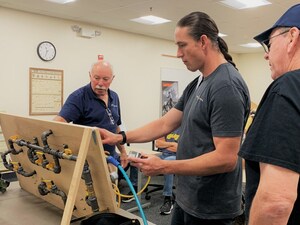Portable, Reliable, Propane Enables Resiliency and Recovery after Historic Devastation
RICHMOND, Va., Oct. 31, 2024 /PRNewswire/ -- During the historic 2024 hurricane season, hundreds of thousands of Americans have lost access to power, heat, cooking, and hot water, creating an urgent need for propane to get through the ensuing days and weeks. Propane companies around the country have rallied to provide immediate and long-term relief, helping communities get back on their feet. From local suppliers restoring services to customers in their own communities to regional and national companies dispatching fuel and supplies to hard-hit areas, the propane industry is uniquely positioned to provide essential energy that saves lives.
"What we've seen on display in communities across the southeast is the very best of the propane industry," said Tucker Perkins, president and CEO of the Propane Education & Research Council (PERC). "Each propane retail location is part of the fabric of its community. Springing into action after disaster strikes is a natural extension of that spirit of helping our neighbors. Millions of American homes and businesses rely on propane to power their everyday lives, but it's the people in the industry who ultimately make the difference."
Here are just a few examples of propane companies making a difference in response to Hurricane Helene in Georgia, North Carolina, South Carolina, Tennessee, and Virginia:
Stringer Oil & LP Gas (Anderson, SC)
Stringer, a small operation with six employees total, organized propane cylinders, parts, and other supplies and delivered them to several locations in western North Carolina, including Bakersville, Burnsville, and Newland. Stringer delivered 50 propane cylinders and 200 propane tank regulators to Youngs Fuel Service, another small family-owned company that suffered severe losses to the storm. Owner Reagan Bonnette has returned to western North Carolina several times and plans to make regular visits to bring supplies and offer support to communities attempting to rebuild as winter approaches.
"This recovery is a marathon, not a sprint," said Bonnette. "People have lost everything, and they continue to need help and encouragement, especially with the holidays coming up."
Blossman Gas (Ocean Springs, MS)
Blossman Gas was able to put 36 propane autogas-fueled fuel delivery trucks into service one day after Helene struck in North Carolina, South Carolina, Tennessee, and Georgia, despite the difficulty in accessing retail locations in affected areas and some employees losing their homes. Thanks to onsite propane-powered generators, Blossman was able to fill more than 4,000 grill cylinders in the first eight days after the storm at its Asheville, NC, branch and 1,600 at its Hendersonville, NC branch. Blossman's planning and mobilization allowed the company to support local, state, and federal agencies responding to the disaster.
Paraco Gas (Rye Brook, NY)
Starting Monday, September 30th, Paraco deployed nine tractor trailers from Waterbury, CT, to deliver propane tanks to 21 critical locations across North Carolina, South Carolina, and Georgia. By the end of the operation, Paraco delivered more than 12,000 propane tanks.
Southeast Propane Alliance
The technical team of the Southeast Propane Alliance (SEPATEC), with support from Rinnai, Gardner Marsh, and LG Jordan Oil & Gas (Apex, NC), designed and assembled a portable hot water shower system capable of supplying water for laundry and eight shower units. The unit was assembled at Blossman's staging area in Asheville for use by the community.
Foster Fuels, Inc. (Brookneal, VA)
Foster Fuels, under a contract with the Federal Emergency Management Agency (FEMA), sent 150 trucks and 200 personnel to affected areas, dispatching more than 500,000 gallons of propane and other fuels to power critical relief operations.
AmeriGas (King of Prussia, PA)
AmeriGas partnered with two non-profit organizations, Operation Air Drop and Ground Force Humanitarian Aid, to coordinate the delivery of more than 1,300 propane cylinders via pack mule and ATV to Spruce Pine, NC, and other areas nearby where families and businesses were stranded without power or resources.
Propane has unique characteristics that make it ideally suited for situations where natural gas and electrical utilities are compromised or non-existent. It is easily transported by trucks and stored in tanks. Propane does not degrade over time like gasoline and diesel do. It is also non-toxic and does not pollute water systems, soil, or air in the rare event of a leak.
Propane's reliability and clean emissions profile make it an ideal fuel for standby power generation. Propane generators emit significantly fewer nitrogen oxides (NOx) and far less particulate matter than diesel generators, which still comprise up to 90% of products on the market today. Generators that are designed to run on propane, rather than retrofitted, also reduce carbon dioxide (CO2) emissions compared with diesel.
Learn more about propane power generation at propane.com.
About PERC: The Propane Education & Research Council is a nonprofit that provides leading propane safety and training programs and invests in research and development of new propane-powered technologies. PERC is operated and funded by the propane industry. For more information, visit Propane.com.
Contact: Matt Butner, 202-452-8975, [email protected]
SOURCE Propane Education & Research Council

WANT YOUR COMPANY'S NEWS FEATURED ON PRNEWSWIRE.COM?
Newsrooms &
Influencers
Digital Media
Outlets
Journalists
Opted In






Share this article